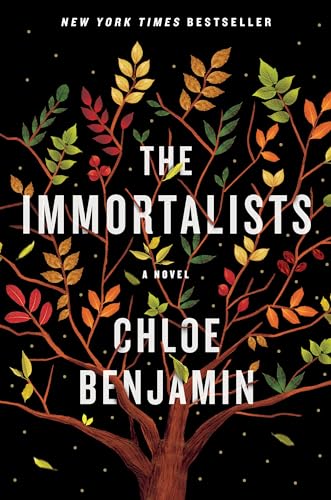In 1969, the Gold siblings range from 13 to 7 years old and they cannot resist when they hear that there's a rishika, a fortune teller, in their neighborhood and that she can tell you when you'll die. Borrowing courage from each other they set out to visit ehr together but each goes in alone to hear the date of their death. They are unsettled and uncertain how to take what they've been told but for the most part, their lives continue onward, affected more by the death of their close-lipped father than by the knowledge they've been given. Simon, the youngest, has always been the one to whom the family tailoring business is supposed to fall but he feels stifled by this expectation, choosing instead to flee to San Francisco with his older sister, immersing himself in the life he could never have embraced in New York. He becomes a dancer, the grand passion of his life, and learns to love himself as he is. Sister Klara, who escaped from home with Simon yearns to become a magician, flitting all over while learning illusion and showmanship. She marries, has a baby she adores, and even finally finds success professionally but she's still not happy and her death date hangs always over her head. Oldest brother Daniel has always wanted to be a doctor, joining the army after medical school. Unwilling to pass unfit recruits through their medical exams despite orders from a superior to do just that, Daniel's job is hanging by a thread, his connection with his family has long been distant, and he finds himself enmeshed in an FBI investigation into the fortune teller from so many years before. Varya, the oldest Gold child, is a longevity scientist who works with monkeys. Her favorite is Frida, who is not just a research subject but a sort of surrogate child. When a journalist named Luke arrives to profile the center where Varya works, she is forced to confront the past, hers and her siblings', and how that has made her the person she is now.
Obviously this is a book about life and death but it is also a book about family and truly living. It acknowledges that words and stories are important, both those we tell others and those we tell ourselves. Once the fateful dates have been spoken, they cannot be undone and can only grow and take on meaning. The deaths, and there are deaths, are different and mostly fitting for the characters. Some are more believable and poignant than others for sure and the book is stronger in the beginning than in the end when Benjamin tells the reader the conclusions they should have come to about life and the importance of living it to the fullest. The narrative itself is split into a prologue and then four sections, each centered on one of the siblings while the others fade into the background, and finally ending in 2010 with old memories intertwining effortlessly, appropriately enough, with a tentative look to an unspoken and unfated future. The idea of the story is intriguing for sure and if the book is a little uneven in execution, it will still give readers much to consider and discuss.







No comments:
Post a Comment
I have had to disable the anonymous comment option to cut down on the spam and I apologize to those of you for whom this makes commenting a chore. I hope you'll still opt to leave me your thoughts. I love to hear what you think, especially so I know I'm not just whistling into the wind here at my computer.